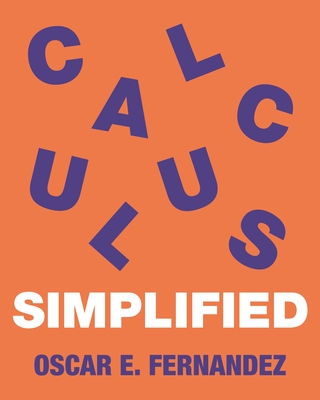

 Princeton University Press
Princeton University Press
Calculus Simplified


Key Metrics
- Oscar Fernandez
- Princeton University Press
- Paperback
- 9780691175393
- 9.9 X 7.9 X 0.9 inches
- 1.4 pounds
- Mathematics > Calculus
- English
 Secure Transaction
Secure TransactionBook Description
An accessible, streamlined, and user-friendly approach to calculus
Calculus is a beautiful subject that most of us learn from professors, textbooks, or supplementary texts. Each of these resources has strengths but also weaknesses. In Calculus Simplified, Oscar Fernandez combines the strengths and omits the weaknesses, resulting in a Goldilocks approach to learning calculus: just the right level of detail, the right depth of insights, and the flexibility to customize your calculus adventure.
Fernandez begins by offering an intuitive introduction to the three key ideas in calculus--limits, derivatives, and integrals. The mathematical details of each of these pillars of calculus are then covered in subsequent chapters, which are organized into mini-lessons on topics found in a college-level calculus course. Each mini-lesson focuses first on developing the intuition behind calculus and then on conceptual and computational mastery. Nearly 200 solved examples and more than 300 exercises allow for ample opportunities to practice calculus. And additional resources--including video tutorials and interactive graphs--are available on the book's website.
Calculus Simplified also gives you the option of personalizing your calculus journey. For example, you can learn all of calculus with zero knowledge of exponential, logarithmic, and trigonometric functions--these are discussed at the end of each mini-lesson. You can also opt for a more in-depth understanding of topics--chapter appendices provide additional insights and detail. Finally, an additional appendix explores more in-depth real-world applications of calculus.
Learning calculus should be an exciting voyage, not a daunting task. Calculus Simplified gives you the freedom to choose your calculus experience, and the right support to help you conquer the subject with confidence.
- An accessible, intuitive introduction to first-semester calculus
- Nearly 200 solved problems and more than 300 exercises (all with answers)
- No prior knowledge of exponential, logarithmic, or trigonometric functions required
- Additional online resources--video tutorials and supplementary exercises--provided
Author Bio
Professor Fernandez is an applied mathematician by training. His main research field is geometric mechanics, which applies advanced mathematical tools and techniques to study the dynamics of various types of systems (e.g., mechanical systems). More recently, he has been applying those tools and techniques to shed new light on problems in mathematical demography, including how life span inequality changes across time and species.
Professor Fernandez also has a passion for teaching and aspires to make mathematics accessible, engaging, and understandable. He employs a systems thinking approach to operationalize these ideals, designing programming and creating resources that leverage and synergize the connections among students, faculty, and staff.
For example, in 2012, he co-founded the Wellesley Emerging Scholars Initiative (WESI), a program that provides underrepresented students of color studying mathematics with a learning community centered on excellence in mathematics. WESI received funding from the Mathematical Association of America-Tensor SUMMA and in 2015 was named a Bright Spot in Hispanic Education by the White House Initiative for Educational Excellence for Hispanics. Professor Fernandez is also the author of Everyday Calculus (2014), The Calculus of Happiness (2017), and Calculus Simplified (2019), all published by Princeton University Press.
The first two books uncover the mathematics hidden behind everyday events and activities, making mathematics accessible and personally relevant to a large audience. Professor Fernandez’ latest book, Calculus Simplified, teaches college-level first-semester calculus assuming no prior knowledge of transcendental functions. (Such content is still covered in the book but optional.) This approach makes calculus accessible to students with as little as an Algebra II background.
Research Interests
Research is in geometric mechanics (specifically, nonholonomic mechanics) and in mathematical demography. Presently researching quantum nonholonomic mechanics as well as the applications of the calculus of variations to problems in mathematical demography.
Source: Wellesley College
Photo Credit: Richard Howard
Videos
No Videos
Community reviews
Write a ReviewNo Community reviews